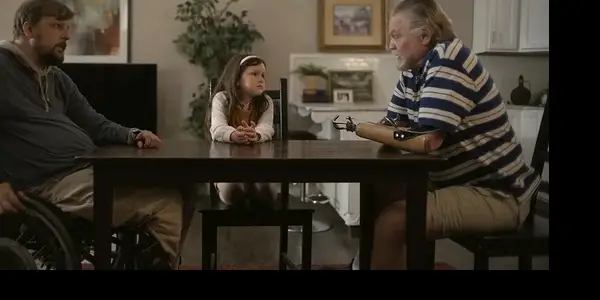
Representation in film matters. Whether we realize it or not, whether we benefit from it or not. As Michelle Obama once said to Variety: “For so many people, television and movies may be the only way they understand people who aren’t like them.” It can be easy to forget that the perspective of others greatly differs from our own, and it’s important to explore film and television, as well as books and other content, that provide those perspectives so we can have a well-rounded view of the world. However, despite differing viewpoints, the struggles are often not unlike our own, which further reminds us of how similar we can be despite differences of race, gender, economic status, or disability. Daruma, the newest feature from director and cinematographer Alexander Yellen and written by Kelli McNeil-Yellen, is an inspiring example of why media like this is so necessary.
The Struggles of Family, Friends, and Forgiveness
Patrick (Tobias Forrest), an Iraq veteran who requires the use of a wheelchair after a life-changing accident, spends much of his time drinking in the same strip club every night. After arguing with Social Security over his benefits and quitting his job (who paid him cash so he could keep the benefits), he’s sent further spiraling. Then one morning, he’s peeled off the floor by two social workers (Brian Kim McCormick and Kelli McNeil-Yellen) from the Department of Children Welfare, still reeking of alcohol from the night before. Unbeknownst to him, he has a child. Since her mother has died, it’s now up to him to take care of four-year-old Camilla (Victoria Scott). Otherwise, she’s sent to live with her maternal grandparents across the country.
source: Daruma Media
Patrick rejects all responsibility for Camilla; that is, until he learns the state will pay him to take care of her. With immense effort, he cleans up the house and takes her to purchase a bed, with the help of Anna (Abigail Hawk), who is way nicer to him than she needs to be, eventually slipping her number into his pocket. After keeping his distance, despite Anna’s repeated texts and bold advances, he finally agrees to have her spend the night. However, Camilla’s gotten more comfortable in the house and has begun to act out a bit, which leads to her playing in the street at 3 a.m. and being found by Patrick’s crotchety neighbor, Robert (John W. Lawson). This causes Patrick to spiral once more, blaming Anna’s appearance for allowing this to happen and kicks her out, much to her shock and anger.
No longer feeling that he’s able to care for Camilla, he signs her guardianship over to her grandparents. There’s another snag, though, as they’re not able to come collect her, so it’s up to Patrick to get her from Arizona to Rhode Island. Unable to drive, and refusing to fly with her, he’s forced to enlist Robert’s help, who only agrees if Patrick pays him and fixes his windshield – which Patrick broke with a misaimed beer bottle in the first place. So begins a touching road-trip dramedy with two unlikely companions that will soften the heart of even the biggest “poo-poo head,” in Robert’s words. Daruma is the emotional stuff that indie films are made of, touching on everything from PTSD to disabilities, redemption, forgiveness, and family without ever seeming forced or trite in any aspect.
source: Daruma Media
Lawson gives an impassioned performance as Robert, giving every scene his all and delivering some of the most emotionally charged moments of the film. Forrest convincingly conveys Patrick’s struggles as well, and is so powerful in the role that even in those slight moments where his cold heart is thawed by Camilla, we feel it ourselves. The rest of the cast is just as commendable, with Scott’s scene-stealing cuteness, Hawk’s affection-turned-disdain for Patrick, McCormick and McNeil’s blend of hope and exasperation at Patrick’s failed attempts to get himself together, and Barry Bostwick’s small yet poignant role as Camilla’s grandfather all shining in their own moments.
Daruma: Emotionally-Charged and Important
Plot and performances aside, this film is gaining attention for its pointed efforts at authentic casting, with Forrest being a c-level quadriplegic and Lawson a double hand amputee, including an article in Forbes. According to the film’s website, Daruma “is the first film in US cinematic history to star two authentically cast disabled leads in a narrative not about overcoming disability.” In this way, McNeil and director Alexander Yellen have provided the world with an example of representation as not a marketing gimmick or forced diversity, but simply a story revolving around people who happen to have these disabilities, which makes this film all the more important.
Want to hear more about Daruma? Check out Kristy Strouse’s roundtable interview with cast and crew from Slamdance 2024!
Daruma is now available through VOD.
Does content like this matter to you?
Become a Member and support film journalism. Unlock access to all of Film Inquiry`s great articles. Join a community of like-minded readers who are passionate about cinema – get access to our private members Network, give back to independent filmmakers, and more.












